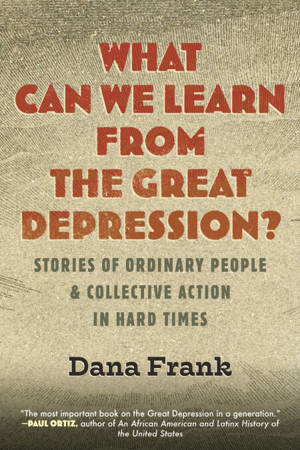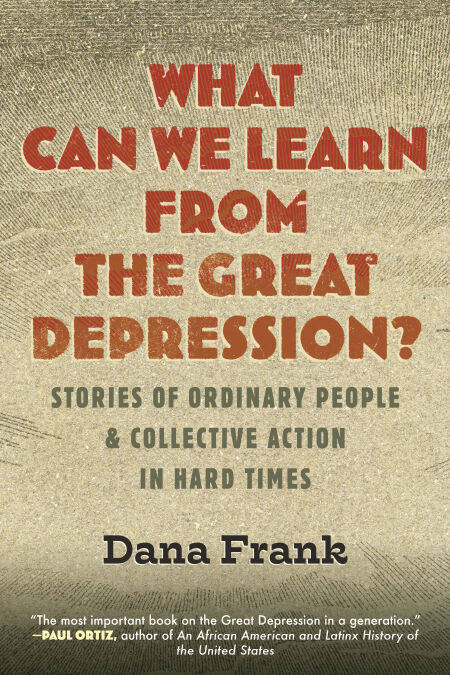
- Retrait gratuit dans votre magasin Club
- 7.000.000 titres dans notre catalogue
- Payer en toute sécurité
- Toujours un magasin près de chez vous
- Retrait gratuit dans votre magasin Club
- 7.000.0000 titres dans notre catalogue
- Payer en toute sécurité
- Toujours un magasin près de chez vous
What Can We Learn from the Great Depression? EBOOK
Stories of Ordinary People & Collective Action in Hard Times
Dana Frank
Ebook | Anglais
39,38 €
+ 39 points
Format
Description
4 stories of resilience, mutual aid, and radical rebellion that will transform how we understand the Great Depression
Drawing on little-known stories of working people, What Can We Learn from the Great Depression? amplifies voices that have been long omitted from standard histories of the Depression era.
In four tales, Professor Dana Frank explores how ordinary working people in the US turned to collective action to meet the crisis of the Great Depression and what we can learn from them today. Readers are introduced to
the 7 daring Black women who worked as wet nurses and staged a sit-down strike to demand better pay and an end to racial discrimination the groups who used mutual aid, cooperatives, eviction protests, and demands for government relief to meet their basic needs the million Mexican and Mexican American repatriados who were erased from mainstream historical memory, while (often fictitious) white “Dust Bowl migrants” became enshrined the Black Legion, a white supremacist fascist organization that saw racism, antisemitism, anti-Catholicism, and fascism as the cure to the Depression
While capitalism crashed during the Great Depression, racism did not and was, in fact, wielded by some to blame and oppress their neighbors. Patriarchy persisted, too, undermining the power of social movements and justifying women’s marginalization within them. For other ordinary people, collective action gave them the means to survive and fight against such hostilities.
What resulted were powerful new forms of horizontal reciprocity and solidarity that allowed people to provide each other with the bread, beans, and comradeship of daily life. The New Deal, when it arrived, provided vital resources to many, but others were cut off from its full benefits, especially if they were women or people of color.
What Can We Learn from the Great Depression? shows us how we might look to the past to think about how we can shape the future of our own failed economy. These lessons can also help us imagine and build movements to challenge such an economy—and to transform the state as a whole—in service to the common good without replicating racism and patriarchy.
Drawing on little-known stories of working people, What Can We Learn from the Great Depression? amplifies voices that have been long omitted from standard histories of the Depression era.
In four tales, Professor Dana Frank explores how ordinary working people in the US turned to collective action to meet the crisis of the Great Depression and what we can learn from them today. Readers are introduced to
the 7 daring Black women who worked as wet nurses and staged a sit-down strike to demand better pay and an end to racial discrimination the groups who used mutual aid, cooperatives, eviction protests, and demands for government relief to meet their basic needs the million Mexican and Mexican American repatriados who were erased from mainstream historical memory, while (often fictitious) white “Dust Bowl migrants” became enshrined the Black Legion, a white supremacist fascist organization that saw racism, antisemitism, anti-Catholicism, and fascism as the cure to the Depression
While capitalism crashed during the Great Depression, racism did not and was, in fact, wielded by some to blame and oppress their neighbors. Patriarchy persisted, too, undermining the power of social movements and justifying women’s marginalization within them. For other ordinary people, collective action gave them the means to survive and fight against such hostilities.
What resulted were powerful new forms of horizontal reciprocity and solidarity that allowed people to provide each other with the bread, beans, and comradeship of daily life. The New Deal, when it arrived, provided vital resources to many, but others were cut off from its full benefits, especially if they were women or people of color.
What Can We Learn from the Great Depression? shows us how we might look to the past to think about how we can shape the future of our own failed economy. These lessons can also help us imagine and build movements to challenge such an economy—and to transform the state as a whole—in service to the common good without replicating racism and patriarchy.
Spécifications
Parties prenantes
- Auteur(s) :
- Editeur:
Contenu
- Nombre de pages :
- 336
- Langue:
- Anglais
Caractéristiques
- EAN:
- 9780807046944
- Date de parution :
- 07-10-24
- Format:
- Ebook
- Protection digitale:
- Adobe DRM
- Format numérique:
- ePub

Les avis
Nous publions uniquement les avis qui respectent les conditions requises. Consultez nos conditions pour les avis.






